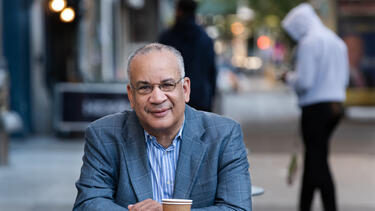Finance
The Corporation Is Centuries Older than We Thought
The genesis of the joint-stock company is usually traced to the founding of the English East India Company and the Dutch East India Company around 1600. New research co-authored by Prof. William Goetzmann says this origin story may be off by centuries.

Navigating a New Now: Investing in ‘Tough Tech’
A venture fund led by Katie Rae ’97 was providing the patient capital required for breakthroughs on major societal problems like climate change and community health. Then COVID-19 complicated their day-to-day work—and gave their efforts greater urgency.

Requiring Short Seller Disclosure Could Distort Markets
A study by Yale SOM's Frank Zhang suggests that requiring disclosures of short positions would lead some investors to make decisions based on others’ short positions, rather than information about a firm; this “herding” could drive stock prices away from their true value.

Can Mergers and Acquisitions Reduce Employee Misconduct?
New research co-authored by Prof. Heather Tookes looks at whether employee misconduct in the highly regulated investment advisory industry goes down after a merger, potentially making the combined company more valuable.

Is Climate Risk More than Markets Can Handle?
Yale SOM finance professor Stefano Giglio lays out the unique complications of grappling with climate risk, and explains his own work on stock portfolios that hedge climate change.

How ‘Stablecoins’ Could Unleash Chaos
Dollar-pegged cryptocurrencies are rapidly proliferating. But without regulation, these so-called stablecoins pose serious risks to the U.S. financial system, argue Yale SOM’s Gary B. Gorton and his co-author.

Keeping Community in the Investment Equation
In this series, leaders tell stories about drawing on their core values in critical moments. For Lofton Holder ’90, grounding investing acumen in a connection to community builds trust and delivers returns.

What Does It Take to Create Financial Products That Can Save the Planet?
Investors are increasingly eager to contribute to solutions for climate change and other environmental problems. Charlotte Kaiser ’07 of The Nature Conservancy’s NatureVest explains how the company builds financial products that attract mainstream capital while delivering conservation impacts.

Study: Margin Trading Causes Stock Prices to Drop in Concert
During financial crises, stocks tend to fall together more than they should. A new study co-authored by Yale SOM’s Heather Tookes suggests that margin trading plays a substantial role in driving this downward spiral.

Study: Rising Seas Aren’t Causing Coastal Property Values to Decline
Climate change is causing sea levels to rise, threatening expensive waterfront properties. But according to a new study co-authored by Yale SOM’s Matthew Spiegel, prices are not falling in the areas most likely to be affected.

Is Bitcoin a Bubble?
The price of a single Bitcoin is up more than 700% since the beginning of 2020, defying years of predictions of a crash. We asked Prof. Aleh Tsyvinski, professor of economics at Yale, to shed some light on the continuing phenomenon.
